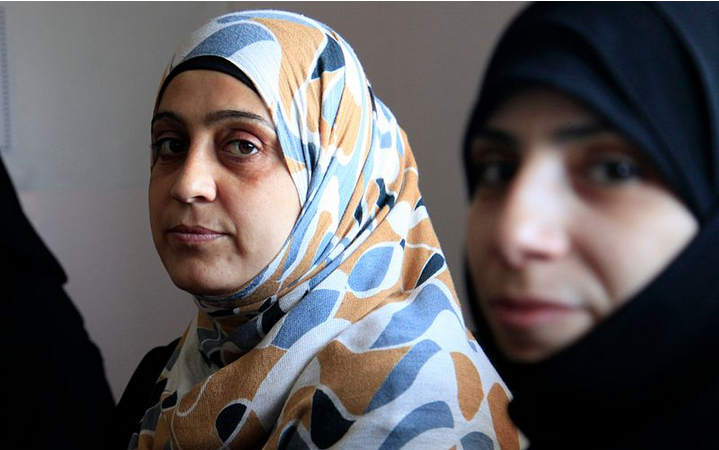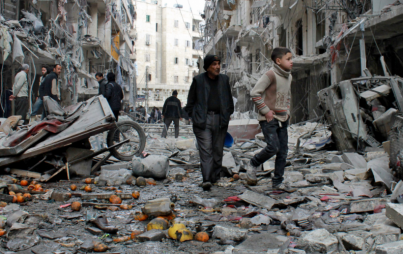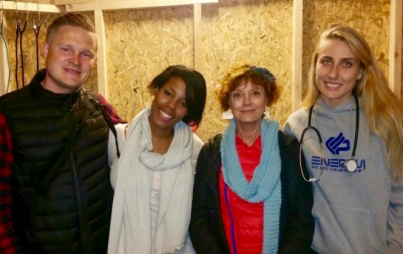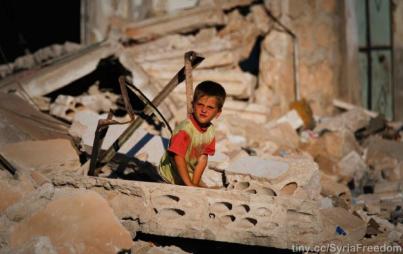
"My role as a woman has completely changed. I was independent and strong in Syria. I was free. When I got [to Cairo] my life went down to below zero." — Iman
“I have no choice but to be strong. Sometimes if my tears drop, I keep it to myself and don’t let them see. When you are weak, you are done.” — Lina
"I was living in dignity, but now no one respects me because I'm not with a man." — Zahwa
These are just a few of the heart-wrenching quotes from Syrian women refugees highlighted in today’s UNHCR’s report—Woman Alone – the Fight for Survival by Syrian Refugee Women—a microscopic snapshot of the hardships faced by the more than 145,000 Syrian refugee families now headed up by women. The report states that Syrian women are: "Forced to take sole responsibility for their families after their men were killed, captured or otherwise separated, are caught in a spiral of hardship, isolation and anxiety."
Considering other aspects of the report and the extremities to which women have been forced to go to maintain a semblance of dignity and survival, even this feels like an anemic understatement.
In the continual wake of war in Syria—which broke out in 2011—at least 2.8 million Syrians have fled the conflict, finding new “homes”—if you can call the “sub-standard shelters” that 40% of refugees live in, homes that is. (The shelters are scattered throughout nearby Lebanon, Jordan, Turkey, and Iraq.) So far, it’s estimated that more than 162,000 people have been killed in the ongoing conflict. As many of them have been men, now more than one in four refugee families are headed up by women. And the destitution they face is truly daunting:
For hundreds of thousands of women, escaping their ruined homeland was only the first step in a journey of grinding hardship. They have run out of money, face daily threats to their safety, and are being treated as outcasts for no other crime than losing their men to a vicious war. It's shameful. They are being humiliated for losing everything. —UNHCR chief Antonio Guterres:
Among the innumerable struggles these women and their families face, is the basic need for food and shelter. A 70 year-old grandmother in Cairo goes without food to ensure her granddaughters can eat: "I don't eat until they're full. I'm happy to eat a toasted piece of bread to make sure they get enough to eat." Those who receive vouchers from the World Food Program often have to sell them to cover rent.
This isn’t surprising as only one in five women surveyed for the report had found paid work. Contrast that with the one in three women who are too afraid or overwhelmed to leave their houses, their isolation and despair palpable: “I don’t want to leave the house because of the sadness in my heart. We left death in Syria only to find it waiting for us here in Egypt,” said Nuha from Cairo.
Extreme measures to ensure survival abound. Some women are being encouraged to sell their underage daughters into marriages in order to support the rest of their families; in fact, a recent Vice article reveals the devastating prevalence of child labor among young Syrian refugees. Children, such as 12 year-old Abdullah, work 12 hour days, six days a week—all for a wage of only about 40 cents an hour. His plight, sadly, is not uncommon; the Jordanian government estimates that 10% of the 600,000 Syrian refugees in Jordan are laboring children.
And then there’s the constant threat of sexual harassment and violence.
According to a Daily Beast article on the issue of survival sex among refugees, some women have been compelled to trade sexual favors for a livelihood: “They treat me like an animal. But then that is what I have become.” These are the words of 16-year-old Ishtar, a refugee living in Lebanon. Penniless and desperate, Ishtar has succumbed to the aggressive sexual harassment on the streets of Beirut and turned to sex to survive. Her days are marked by rough encounters in abandoned buildings or cars, for which she receives $20 or $30.
Maddeningly, even foreign NGO workers—you know, those whom women are supposed to be able to trust—take advantage of women’s vulnerability. Maryam, a 31-year-old Syrian refugee and mother of five has lived in fear since fleeing her country’s violence to Lebanon. Not only does she face nonstop verbal harassment and groping on the street, but even aid workers are seeking to take advantage of her: “One of the men at an NGO told her that if you accept to sleep with me, if we can have sexual relations, every time I have any kind of access to assistance, it will be yours. It will have your name on it.”
And while the UNHCR report highlights resources for women facing sexual and gender-based violence, several women noted that they were unlikely to speak out about such issues due to the heavy stigma such violence carries: “I would never turn to an organization for help. I would put salt on the wound and stay quiet, but I’d never ever say anything to anyone. That would cause more harm than good,” reported Akkar from Lebanon.
We wish we had an uplifting note to end on, but as UN Chief Guterres emphasizes, that’s far from possible. He calls the report a “wake-up call.” And “If it makes you uncomfortable to read it, it should.”
Uncomfortable doesn't begin to cover it.
Photo courtesy of Wikimedia






